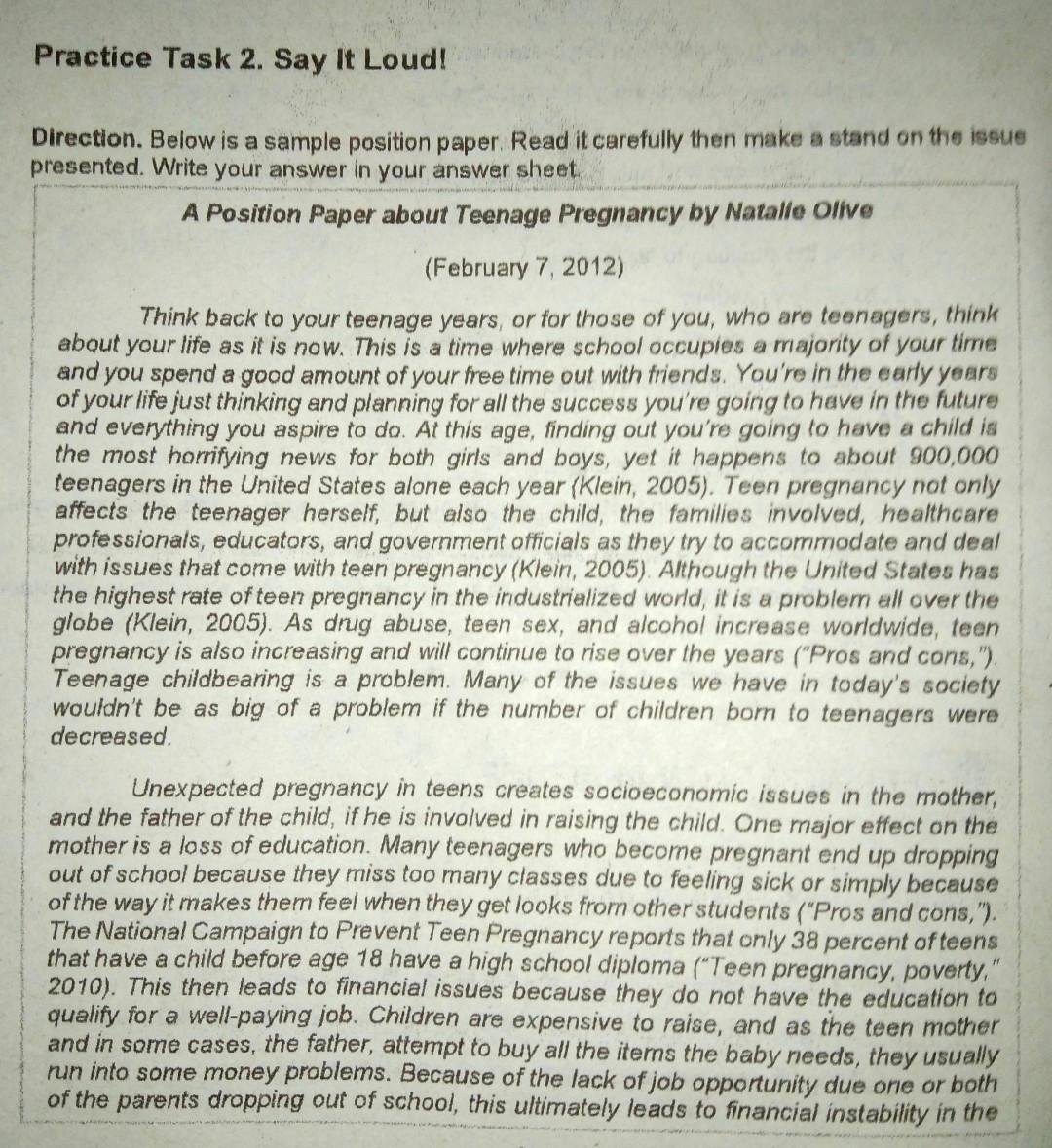Teenage pregnancy is a pressing issue that calls for attention and action. In this position paper about teenage pregnancy, we delve into the complexities surrounding this topic, seeking to address the challenges and propose effective solutions. We understand the need for immediate intervention, and by engaging in meaningful dialogue, we can work towards creating a society where teenage pregnancy is minimized, and young individuals have the support and resources they need to thrive. Join us on this journey as we explore the various facets of this issue and strive for a healthier and more empowered future for our teenagers.
Position Paper about Teenage Pregnancy
Introduction to Teenage Pregnancy
Teenage pregnancy is a complex and sensitive issue that affects individuals, families, and societies worldwide. It refers to the occurrence of pregnancy in girls aged 19 years or younger. While the rates of teenage pregnancy have been declining in recent years, it remains a significant concern due to its potential negative impacts on the physical, emotional, and social well-being of both the mother and child.
The Causes of Teenage Pregnancy
Teenage pregnancy can be attributed to multiple factors, including:
1. Lack of comprehensive sex education: Inadequate or incomplete sex education programs in schools may contribute to a lack of knowledge about contraceptive methods and safe sexual practices.
2. Peer pressure and influence: Adolescents may engage in sexual activities due to societal pressure or the influence of their peers.
3. Socioeconomic factors: Teenagers from disadvantaged backgrounds may face higher risks of teenage pregnancy due to limited access to education and healthcare, as well as higher rates of poverty.
4. Family dynamics: Dysfunction within families, such as lack of parental involvement or supervision, may increase the likelihood of teenage pregnancy.
5. Media influence: Media portrayal of sexual relationships and teenage pregnancy can shape adolescents’ attitudes and behaviors towards sex.
6. Substance abuse: Drug and alcohol abuse can impair judgment and increase the likelihood of engaging in unprotected sexual activities.
The Consequences of Teenage Pregnancy
Teenage pregnancy can have various consequences for both the teenage mother and her child:
1. Health risks for the mother: Teenage mothers face higher risks of complications during pregnancy and childbirth, such as preterm birth, low birth weight, and anemia.
2. Interrupted education: Pregnancy often disrupts a teenager’s education, leading to lower educational attainment and limited career prospects.
3. Financial challenges: Teenage mothers may struggle financially due to the additional expenses associated with raising a child, potentially perpetuating a cycle of poverty.
4. Emotional and psychological impact: Teenage pregnancy can lead to increased stress, anxiety, and depression for the mother, as well as strained relationships with family members and peers.
5. Risk of child maltreatment: Young, inexperienced mothers may face difficulties in providing adequate care for their children, increasing the risk of neglect or abuse.
6. Intergenerational cycle: Teenage mothers are more likely to have children who also become teenage parents, perpetuating the cycle of teenage pregnancy.
Prevention and Intervention Strategies
Efforts to address teenage pregnancy involve a comprehensive approach that includes the following strategies:
1. Comprehensive sex education: Providing age-appropriate and evidence-based sex education is crucial to equipping adolescents with the knowledge and skills to make informed decisions about their sexual health.
2. Access to contraception: Ensuring affordable and easily accessible contraceptive methods can help reduce the risk of unintended pregnancies among teenagers.
3. Supportive parenting: Encouraging open communication between parents and adolescents, as well as providing guidance and supervision, can help prevent teenage pregnancy.
4. Youth-friendly healthcare services: Establishing healthcare services specifically tailored to the needs of teenagers can promote access to reproductive healthcare, including contraceptive counseling and STD testing.
5. Empowerment and life skills programs: Providing programs that focus on building self-esteem, decision-making skills, and future planning can empower teenagers to make responsible choices.
6. Community involvement: Engaging community organizations, schools, and healthcare providers in raising awareness and providing resources can contribute to preventing teenage pregnancies.
The Role of Society in Addressing Teenage Pregnancy
Addressing teenage pregnancy requires collective efforts from society as a whole:
1. Breaking stigmas and promoting empathy: Society needs to eliminate judgment and stigma associated with teenage pregnancy, instead offering support and understanding to young mothers.
2. Promoting gender equality: Addressing the underlying causes of teenage pregnancy involves promoting gender equality, empowering girls through education, and challenging harmful stereotypes.
3. Providing social support systems: Creating support systems that offer financial assistance, childcare, and educational opportunities can help teenage mothers overcome the challenges they face.
4. Media responsibility: Media should portray responsible sexual behavior and promote positive role models to influence teenagers’ attitudes and behaviors.
5. Advocacy and policy changes: Advocacy efforts are necessary to bring about policy changes that prioritize comprehensive sex education, access to contraception, and support for teenage parents.
In conclusion, addressing teenage pregnancy requires a multi-faceted approach that focuses on prevention, intervention, support, and societal change. By providing comprehensive sex education, access to contraception, and support systems for young parents, we can work towards reducing the rates and consequences of teenage pregnancy. It is crucial for society to understand the complexities of this issue and strive towards creating an environment where teenage pregnancy is minimized, and the wellbeing of adolescents is prioritized.
TEENAGE PREGNANCY: KNOW THE FACTS, CAUSES, EFFECTS AND HOW TO PREVENT #teenagepregnancy
Frequently Asked Questions
What is teenage pregnancy?
Teenage pregnancy refers to the occurrence of pregnancy in a female who is under the age of 20 years. It usually involves girls between the ages of 13 and 19, who become pregnant unintentionally and may face various challenges due to their young age and lack of preparedness for parenthood.
Why is teenage pregnancy a significant issue?
Teenage pregnancy is a significant issue because it can have detrimental effects on both the teenage mother and her child. Teen mothers are more likely to experience health complications, face social stigma, and have limited educational and career opportunities. Children born to teenage mothers also face higher risks of health and developmental issues.
What are the causes of teenage pregnancy?
Teenage pregnancy can occur due to various factors, including lack of comprehensive sex education, limited access to contraceptives, peer pressure, low self-esteem, family or community norms, poverty, and a lack of parental guidance or support.
What are the potential consequences of teenage pregnancy?
Teenage pregnancy can have numerous consequences for both the mother and the child. Some potential consequences include disruption of education, limited career options, financial difficulties, increased risk of mental health issues, higher chances of child neglect or abuse, and a cycle of intergenerational teenage pregnancy.
How can teenage pregnancy be prevented?
Preventing teenage pregnancy requires a comprehensive approach involving education, access to contraception, support systems, and addressing underlying factors. Effective sex education programs, easily accessible contraceptives, promoting positive youth development, enhancing parental involvement, and reducing societal stigma can all contribute to preventing teenage pregnancy.
What support is available for pregnant teenagers?
Pregnant teenagers can seek support from various sources. These include healthcare professionals, school counselors, community organizations, and support groups specifically tailored for young mothers. Additionally, there are government programs and initiatives that provide financial assistance, medical care, and educational resources to teenage mothers.
Final Thoughts
Teenage pregnancy remains a pressing issue that requires immediate attention. A position paper on teenage pregnancy emphasizes the need for comprehensive sex education, accessible healthcare services, and supportive programs for pregnant teenagers. By addressing the root causes and offering practical solutions, we can tackle this problem effectively. It is vital to prioritize the well-being of young girls and provide them with the resources and knowledge they need to make informed decisions about their reproductive health. By actively engaging in this issue, we can make a positive impact and reduce the rates of teenage pregnancy in our society. Position Paper about teenage pregnancy calls for action towards a more informed and supportive environment for adolescents.


